Cherepovets
Cherepovets (Russian: Череповец, IPA: [tɕɪrʲɪpɐˈvʲɛts]) is a city in Vologda Oblast, Russia, located in the west of the oblast on the banks of the Sheksna River (a tributary of the Volga River) and on the shores of the Rybinsk Reservoir. As of the 2010 Census, its population was 312,310, making it the most populous city in the oblast.[7]
Cherepovets
Череповец | |
|---|---|
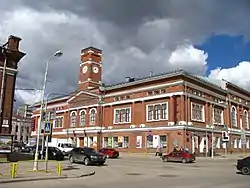 Theatre in old town | |
.svg.png.webp) Flag .gif) Coat of arms | |
Location of Cherepovets 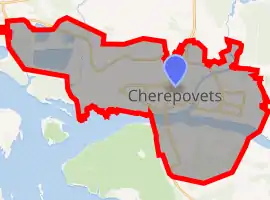 | |
 Cherepovets Location of Cherepovets 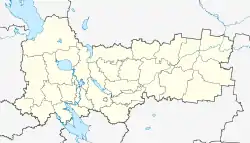 Cherepovets Cherepovets (Vologda Oblast) | |
| Coordinates: 59°07′N 37°54′E | |
| Country | Russia |
| Federal subject | Vologda Oblast[2] |
| Founded | November 4, 1777[3] |
| City status since | 1777 |
| Government | |
| • Body | City Duma[4] |
| • Mayor[5] | Vadim Germanov[5] |
| Area | |
| • Total | 120.9 km2 (46.7 sq mi) |
| Elevation | 130 m (430 ft) |
| Population | |
| • Total | 312,310 |
| • Estimate (2018)[8] | 317,970 (+1.8%) |
| • Rank | 59th in 2010 |
| • Density | 2,600/km2 (6,700/sq mi) |
Administrative status | |
| • Subordinated to | city of oblast significance of Cherepovets[2] |
| • Capital of | Cherepovetsky District[9], city of oblast significance of Cherepovets[2] |
Municipal status | |
| • Urban okrug | Cherepovets Urban Okrug[10] |
| Time zone | UTC+3 (MSK |
| Postal code(s)[12] | 162600 |
| Dialing code(s) | +7 8202[13] |
| OKTMO ID | 19730000001 |
| Website | www |
| 2010 Census | 312,310[7] |
|---|---|
| 2002 Census | 311,869[14] |
| 1989 Census | 310,463[15] |
| 1979 Census | 265,933[16] |
Etymology
The origin of the word "Cherepovets" is a subject of much debate among the local historians. According to one version, the city supposedly received its name from the word "skull" (Russian: череп, cherep). In antiquity, a pagan sanctuary was there in honor of the god Veles on the hill at the confluence of the Sheksna and Yagorba Rivers. The top of the hill was called the "skull."[17] Another version suggests that the word "Cherepovets" originates from the name of the tribe "Ves" (весь), who inhabited the Sheksna's banks. According to this version, "Cherepovets" in the language of local indigenous Veps means "Veps' fish hill."[18]
Geography
The city is located near the major Volga-Baltic waterway, west-east railroads, gas pipelines, and between two Russian federal cities, Moscow and St. Petersburg.
History

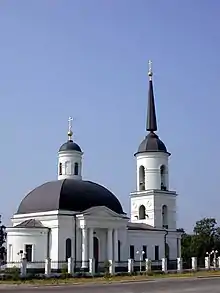
The foundation of Cherepovets is traditionally ascribed to two orthodox monks Feodosy and Afanasy. In 1362, they founded the Cherepovets Resurrection Monastery, in the vicinity of which a small village of Fedosyevo was founded. Historians consider the former village of Fedosyevo to be in the center of modern Cherepovets. Several centuries were needed to develop the small village into a prominent trade, manufacturing, and regional transportation center. Cherepovets was granted city status in 1777 by Catherine the Great and became the center of a separate uyezd in the administrative structure of the Novgorod Governorate.
The construction of the Mariinsk canal system in 1810 made a significant impact on the development of the city. The Mariinsk Canal System connected Cherepovets with the Volga River to the south and the Baltic Sea to the west. At that time, the city was still at a very early stage of development with a population of 3000 residents by 1863. For a long time, the city brickworks with seven workers was the sole industrial enterprise in Cherepovets.
The development of the city became more dynamic after Emancipation Reform happened in 1861 and the appearance of the shipbuilding industry. The city soon became a prominent shipbuilding and logistics center connecting major regional railways and waterways. The population had grown to 10,000 by 1915.
After the revolution, in March 1918, eastern uyezds of the Novgorod Governorate were renamed to separate Cherepovets Governorate centered around Cherepovets. The new governorate existed for less than 10 years. In 1927, it was merged with Leningrad, Novgorod, Pskov, and Murmansk Governorates into a single Leningrad Oblast. In September 1937, most of the former Cherepovets Governorate territories (except for Tikhvin district) were transferred to the newly established Vologda Oblast.
The subsequent development of the city is closely related to the completion of the construction of the Cherepovets steel mill (now known as Severstal) in 1955, the second-largest in the country. Unlike the majority of the most important metallurgy centers in the former Soviet Union, the location of the future steel plant was selected far away from the actual mineral resources and deposits. The reason for that was the logistic advantage of having a well-developed infrastructure that allowed connection of the north and northwest of the country by rail, road, and waterways into a single operation system. It connected such remote mining centers as Vorkuta and Olenegorsk, Murmansk Oblast.
The rapid growth of the industry center drastically changed the city, and by the early 1960s, its population exceeded 100,000 residents (three times bigger than the pre-World War II population). By 1970, Cherepovets had become the most populated city in Vologda Oblast.
Administrative and municipal status
Within the framework of administrative divisions, Cherepovets serves as the administrative center of Cherepovetsky District,[9] although not being a part of it.[1] As an administrative division, it is incorporated separately as the "city of oblast significance of Cherepovets" (one of the four in the oblast), an administrative unit with the status equal to that of the districts.[2] As a municipal division, the city of oblast significance of Cherepovets is incorporated as Cherepovets Urban Okrug.[10]
Economy
Cherepovets is an important industrial center in northwestern Russia, mostly known as the country's largest steel manufacturing plant, with exports going to more than 50 countries around the world.
Metallurgy
The city began growing rapidly with the construction of steel mills in the late 1930s. The first blast furnace was put into operation in 1955. The first Cherepovets iron was produced in August 1955 and steel in May 1958. In February 1959, the first ingot was rolled in a blooming mill, and in November of the same year, the first hot-rolled plate was produced.
Nowadays, complex processes of iron and steel production are highly automated. The workshops have been modernized according to the latest advances in engineering and technology of metal production. The joint-stock company 'Severstal' (LSE, MOEX) is a global exporter of ferrous and nonferrous metals: iron, steel, hot-rolled plates, cold roll-formed shapes, and other products.
Chemical industry
The second largest industry in the city is the chemical industry. Its main production area is concentrated in mineral fertilizers. PhosAgro (LSE, MOEX) is the largest producer of phosphate-based fertilizers and phosphoric and sulfuric acids in Europe. It is also one of the leading producers of NPK fertilizers, ammonia, and ammonium nitrate in Russia.[19]
As an outcome of the high volume of metallurgical and chemical production, Cherepovets is one of the most heavily polluted cities in the world. According to a 2011 assessment, the city ranked second only after Norilsk, Russia.[20]
Transportation
Cherepovets is served by Cherepovets Airport, which is a hub for Severstal Air Company. Cherepovets has rail and road access to Vologda, the administrative center of the oblast, to Moscow, the capital of Russia, and to St. Petersburg. In addition, it is served by Cherepovets Trams which has been active since 1956. The location by the Sheksna River makes water transportation down the Volga–Baltic Waterway possible, with further access to the Baltic Sea. The first-ever cable-stayed bridge in Russia, Oktyabrsky Bridge was built in the city in 1979.[21]
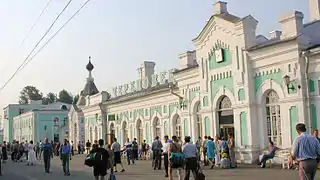 Cherepovets Railway Station
Cherepovets Railway Station_AN1774921.jpg.webp) Cherepovets Airport
Cherepovets Airport.jpg.webp)
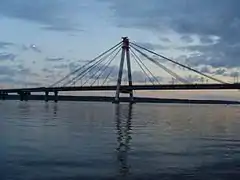 October bridge over Sheksna River,the first cable-stayed bridge in Russia
October bridge over Sheksna River,the first cable-stayed bridge in Russia
Climate
Cherepovets has a distinctive four-seasons humid continental climate[22] (Dfb) (just above subarctic (Dfc)), with warm summers and cold but not extremely cold winters by Russian standards. It falls into the humid continental zone by the fourth warmest month being just above 10 °C (50 °F) in mean temperature and the annual temperature being 3.3 °C (37.9 °F),[23] above the freezing point. Winter, however, lasts for five months, rendering transitional periods rather short.
| Climate data for Cherepovets (1991–2020, extremes 1955–present) | |||||||||||||
|---|---|---|---|---|---|---|---|---|---|---|---|---|---|
| Month | Jan | Feb | Mar | Apr | May | Jun | Jul | Aug | Sep | Oct | Nov | Dec | Year |
| Record high °C (°F) | 5.4 (41.7) |
6.7 (44.1) |
16.0 (60.8) |
26.0 (78.8) |
32.2 (90.0) |
35.0 (95.0) |
35.7 (96.3) |
36.2 (97.2) |
27.8 (82.0) |
22.5 (72.5) |
12.8 (55.0) |
8.5 (47.3) |
36.2 (97.2) |
| Average high °C (°F) | −6.0 (21.2) |
−4.8 (23.4) |
1.2 (34.2) |
9.5 (49.1) |
17.4 (63.3) |
21.3 (70.3) |
23.7 (74.7) |
21.2 (70.2) |
15.2 (59.4) |
7.1 (44.8) |
−0.3 (31.5) |
−4.0 (24.8) |
8.5 (47.3) |
| Daily mean °C (°F) | −9.2 (15.4) |
−8.7 (16.3) |
−3.7 (25.3) |
3.6 (38.5) |
10.8 (51.4) |
15.1 (59.2) |
17.6 (63.7) |
15.1 (59.2) |
10.0 (50.0) |
3.8 (38.8) |
−2.5 (27.5) |
−6.6 (20.1) |
3.8 (38.8) |
| Average low °C (°F) | −12.6 (9.3) |
−12.5 (9.5) |
−8.1 (17.4) |
−1.6 (29.1) |
4.5 (40.1) |
8.9 (48.0) |
11.7 (53.1) |
9.6 (49.3) |
5.7 (42.3) |
1.0 (33.8) |
−4.8 (23.4) |
−9.5 (14.9) |
−0.6 (30.9) |
| Record low °C (°F) | −45.4 (−49.7) |
−40.3 (−40.5) |
−32.8 (−27.0) |
−23.0 (−9.4) |
−6.1 (21.0) |
−2.8 (27.0) |
0.7 (33.3) |
−1.5 (29.3) |
−9.5 (14.9) |
−21.6 (−6.9) |
−31.3 (−24.3) |
−42.0 (−43.6) |
−45.4 (−49.7) |
| Average precipitation mm (inches) | 44 (1.7) |
35 (1.4) |
35 (1.4) |
29 (1.1) |
49 (1.9) |
68 (2.7) |
75 (3.0) |
73 (2.9) |
54 (2.1) |
58 (2.3) |
51 (2.0) |
48 (1.9) |
619 (24.4) |
| Average extreme snow depth cm (inches) | 36 (14) |
47 (19) |
44 (17) |
10 (3.9) |
0 (0) |
0 (0) |
0 (0) |
0 (0) |
0 (0) |
1 (0.4) |
7 (2.8) |
21 (8.3) |
47 (19) |
| Average rainy days | 5 | 4 | 6 | 12 | 16 | 18 | 17 | 18 | 19 | 18 | 11 | 6 | 150 |
| Average snowy days | 27 | 24 | 18 | 8 | 2 | 0.2 | 0 | 0 | 1 | 8 | 21 | 27 | 136 |
| Average relative humidity (%) | 86 | 83 | 79 | 72 | 68 | 75 | 78 | 82 | 85 | 87 | 88 | 88 | 81 |
| Source: Pogoda.ru.net[24] | |||||||||||||
Modern city
The passing years have left their mark on the city's appearance. Large-scale housing and industrial construction have been carried out in the city. Over the past years, hundreds of new multistory blocks of apartments, detached and semi-detached houses were built in Cherepovets.
Not only is Cherepovets an industrial city, but also it is a center of culture, education, and sport, with associations of local writers, poets, actors, painters, composers, and journalists.
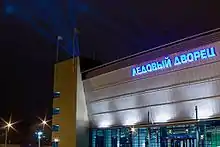
The city invests in sport and sports clubs. Cherepovets' athletes regularly compete in international and internal competitions. The Severstal Cherepovets hockey club is well known in Kontinental Hockey League. The Severstal basketball team, as well as the chess team, are a part of Russian Major League.
Notable residents
- Vasily Vereshchagin (1842–1904), a famous battle painter, was born in Cherepovets.
- Anna Demidova (1878–1918), House of Romanovs maid, murdered with Nicholas II and his family, was born and raised in Cherepovets.
- Alexander Kutepov (1882–1930), White Army general, was born in Cherepovets.
- Igor Severyanin (1887–1941), poet, one of the main figures of the Russian Futurist movement, grew up in Cherepovets.
- Valery Chkalov (1904–1938), aviator, studied at Cherepovets technical school.
- Nikolay Amosov (1913–2002), heart surgeon, was born near Cherepovets and got his education in the city.
- Joseph Brodsky (1940–1996), a Nobel Prize-winning poet and essayist, lived with his family in Cherepovets during the evacuation from Leningrad.
- Nikolai Noskov (born 1956), musician, former singer of Gorky Park, grew up and started his career in Cherepovets.
- Alexander Bashlachev (1960–1988), singer-songwriter and poet, was born and grew up in Cherepovets.
- Leonid Parfyonov (born 1960), journalist and television host, was born and grew up in Cherepovets.
- Dmitri Yushkevich (born 1970), NHL and KHL ice hockey player, was born in Cherepovets and started playing in the Metallurg Cherepovets hockey school.
- Pavel Buchnevich (born 1995 in Cherepovets), is a former KHL and current NHL ice hockey player for the St. Louis Blues.
- Vadim Shipachyov (born 1987 in Cherepovets), is a former NHL ice hockey player with the Vegas Golden Knights and now in the KHL with SKA St. Petersburg.
Twin towns – sister cities
References
Notes
- Resolution #178
- Law #371-OZ
- Энциклопедия Города России. Moscow: Большая Российская Энциклопедия. 2003. p. 516. ISBN 5-7107-7399-9.
- Официальный сайт города Череповца. Городская Дума (in Russian). Череповецкая городская Дума. Retrieved March 27, 2012.
- Сайт мэрии Череповца. Кузин Юрий Александрович, мэр города Череповца (in Russian). Мэрия Череповца. Retrieved March 27, 2012.
- Судаков, Г. В. (2006). Г. В. Судаков (ed.). Вологодская энциклопедия (PDF) (in Russian). Вологда: ВГПУ, Русь. p. 524. ISBN 5-87822-305-8. Retrieved December 17, 2011.
- Russian Federal State Statistics Service (2011). Всероссийская перепись населения 2010 года. Том 1 [2010 All-Russian Population Census, vol. 1]. Всероссийская перепись населения 2010 года [2010 All-Russia Population Census] (in Russian). Federal State Statistics Service.
- "26. Численность постоянного населения Российской Федерации по муниципальным образованиям на 1 января 2018 года". Federal State Statistics Service. Retrieved January 23, 2019.
- Государственный комитет Российской Федерации по статистике. Комитет Российской Федерации по стандартизации, метрологии и сертификации. №ОК 019-95 1 января 1997 г. «Общероссийский классификатор объектов административно-территориального деления. Код 19 256», в ред. изменения №278/2015 от 1 января 2016 г.. (State Statistics Committee of the Russian Federation. Committee of the Russian Federation on Standardization, Metrology, and Certification. #OK 019-95 January 1, 1997 Russian Classification of Objects of Administrative Division (OKATO). Code 19 256, as amended by the Amendment #278/2015 of January 1, 2016. ).
- Law #1104-OZ
- "Об исчислении времени". Официальный интернет-портал правовой информации (in Russian). June 3, 2011. Retrieved January 19, 2019.
- "List of postal codes" (in Russian). Russian Post. Archived from the original on December 12, 2006. Retrieved December 17, 2011.
- Телефонный код города Череповец (in Russian). kody.su. Retrieved December 17, 2011.
- Russian Federal State Statistics Service (May 21, 2004). Численность населения России, субъектов Российской Федерации в составе федеральных округов, районов, городских поселений, сельских населённых пунктов – районных центров и сельских населённых пунктов с населением 3 тысячи и более человек [Population of Russia, Its Federal Districts, Federal Subjects, Districts, Urban Localities, Rural Localities—Administrative Centers, and Rural Localities with Population of Over 3,000] (XLS). Всероссийская перепись населения 2002 года [All-Russia Population Census of 2002] (in Russian).
- Всесоюзная перепись населения 1989 г. Численность наличного населения союзных и автономных республик, автономных областей и округов, краёв, областей, районов, городских поселений и сёл-райцентров [All Union Population Census of 1989: Present Population of Union and Autonomous Republics, Autonomous Oblasts and Okrugs, Krais, Oblasts, Districts, Urban Settlements, and Villages Serving as District Administrative Centers]. Всесоюзная перепись населения 1989 года [All-Union Population Census of 1989] (in Russian). Институт демографии Национального исследовательского университета: Высшая школа экономики [Institute of Demography at the National Research University: Higher School of Economics]. 1989 – via Demoscope Weekly.
- Всесоюзная перепись населения 1979 г. Национальный состав населения по регионам России [All Union Population Census of 1979. Ethnic composition of the population by regions of Russia] (XLS). Всесоюзная перепись населения 1979 года [All-Union Population Census of 1979] (in Russian). 1979 – via Demoscope Weekly (website of the Institute of Demographics of the State University—Higher School of Economics.
- А.Л., Шилов. "Череповец: к этимологии названия: (реализация древне-вепсской традиции номинации населенных пунктов) | Рябининские чтения – 2003| Электронная библиотека | Музей-заповедник "Кижи"". kizhi.karelia.ru (in Russian). Archived from the original on October 2, 2012. Retrieved May 11, 2021.
- "Канал 12 Череповец : Легенды нашего города. История происхождения названия города Череповец". www.kanal12.ru (in Russian). Archived from the original on July 3, 2013. Retrieved May 11, 2021.
- "Chemical Industry". Vologda Oblast Official Website. Retrieved May 17, 2014.
- "Russia's top 10 most polluted cities". RIA Novosti. Retrieved December 17, 2011.
- "Октябрьский мост через реку Шексну в Череповце — Гипростроймост".
- "Cherepovets, Russia, Climate Summary". Weatherbase. Retrieved January 24, 2015.
- "Cherepovets, Russia, Temperature Averages". Weatherbase. Retrieved January 24, 2015.
- "Погода и Климат – Климат Череповец" (in Russian). Weather and Climate (Погода и климат). Retrieved November 12, 2021.
- "Гости из городов-побратимов поздравили Череповец с 241-летием". cherinfo.ru (in Russian). Cherinfo. November 3, 2018. Retrieved December 22, 2020.
- "Представители городов-побратимов поздравили Череповец с юбилеем". cherinfo.ru (in Russian). Cherinfo. November 3, 2017. Retrieved December 22, 2020.
- "俄罗斯切列波韦茨市". jl.gov.cn (in Chinese). Jilin Province. October 18, 2019. Retrieved December 22, 2020.
- "Honoring a sisterhood between Montclair, Graz". montclairlocal.news. Montclair Local. January 31, 2019. Retrieved December 22, 2020.
Sources
- Законодательное Собрание Вологодской области. Закон №371-ОЗ от 4 июня 1999 г. «О вопросах административно-территориального устройства Вологодской области», в ред. Закона №2916-ОЗ от 7 декабря 2012 г. «О внесении изменений в Закон области "О вопросах административно-территориального устройства Вологодской области"». Вступил в силу со дня официального опубликования. Опубликован: "Красный Север", №124–125, 29 июля 1999 г. (Legislative Assembly of Vologda Oblast. Law #371-OZ of June 4, 1999 On the Matters of the Administrative-Territorial Structure of Vologda Oblast, as amended by the Law #2916-OZ of December 7, 2012 On Amending the Oblast Law "On the Matters of the Administrative-Territorial Structure of Vologda Oblast". Effective as of the day of the official publication.).
- Правительство Вологодской области. Постановление №178 от 1 марта 2010 г. «Об утверждении реестра административно-территориальных единиц Вологодской области», в ред. Постановления №686 от 25 июня 2012 г. «О внесении изменений в некоторые Постановления Правительства области». Вступил в силу 20 марта 2010 г. Опубликован: "Красный Север", №29, 20 марта 2010 г. (Government of Vologda Oblast. Resolution #178 of March 1, 2010 On Adopting the Registry of the Administrative-Territorial Units of Vologda Oblast, as amended by the Resolution #686 of June 25, 2012 On Amending Various Resolutions of the Oblast Government. Effective as of March 20, 2010.).
- Законодательное Собрание Вологодской области. Закон №1104-ОЗ от 6 декабря 2004 г. «Об установлении границ города Череповца и наделении его статусом городского округа», в ред. Закона №2809-ОЗ от 5 июля 2012 г. «О внесении изменений в отдельные Законы области, устанавливающие границы и статус муниципальных образований области». Вступил в силу через десять дней со дня официального опубликования. Опубликован: "Красный Север", №242, 11 декабря 2004 г. (Legislative Assembly of Vologda Oblast. Law #1104-OZ of December 6, 2004 On Establishing the Borders of the City of Cherepovets and on Granting It Urban Okrug Status, as amended by the Law #2809-OZ of July 5, 2012 On Amending Various Laws of the Oblast, Establishing the Borders and the Status of the Municipal Formations of the Oblast. Effective as of after ten days from the day of the official publication.).
External links
- Official website of Cherepovets (in Russian)
- Cherepovets Business Directory (in Russian)